Brad Warner's Blog, page 11
June 13, 2011
APPOLOGIES TO THE GARRISON INSTITUTE
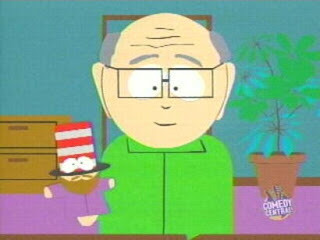
Last weekend I was contacted by Erin Koch of the Garrison Institute, the people who put on the Buddhist Maha Teacher Council I wrote about on Suicide Girls. She said:
"I respect and appreciate the teachers I have worked with for the past year I also respect difference and open communication. I am very sorry you did not receive your invitation. I have a record of your invitation (Dec. 9).
"I do wish you had corrected your blog and facebook page to reflect the truth. Criticism of the event aside, you were invited and your contributions would have been welcome. Noah Levine asked me to invite you which I did on Dec 9. I think of you as sangha and I want the dharma to be of benefit to us all.
"I feel that your post has given the Garrison Institute a negative appearance to many people who had not previously heard of us and this is upsetting to me. Critiquing the event would have been fair and interesting, but suggesting we are closed network that excluded you is just not correct. Even if you had not been invited, you could have contacted us. Many teachers that were unintentionally excluded from the invite list asked to come and none were turned down.
"I wish you and your students all the best and harbor no bad feeling."
So first off, I apologize to Erin Koch and the Garrison Institute for unintentionally misrepresenting them. I don't recall receiving their invitation. But if she says they sent me one, then they must have sent me one. So I was wrong when I said they didn't invite me -- although I didn't know I'd been invited.
But my being invited or not wasn't really the point of the article. I'd wanted to write about the Maha Council event from the first time I heard about it, which was about one week before the event happened. That seems to be about the time they went public with the fact that it was happening, at least as far as I have been able to find out.
When someone on Facebook asked if I was criticizing the event because I was "butt hurt" at having not been invited, I thought that was a good angle to use to say what I wanted to say. Judging by the comments the article received both here and at Suicide Girls, and the emails I got about it, it seems like most readers understood that my not having been invited (or so I thought) was not the main point.
Most of what I wanted to say about the event was covered before I even wrote my article in Marnie Louise Froberg's blog post. It's a bit long. But I think she's on the right track.
My objections to the Maha Teacher's Council probably had as much to do with the event's title as anything else. To call something a Maha Teacher's Council seems to be an attempt to relate it back to the very earliest council's held by Gautama Buddha's followers after Gautama's death. These meetings were intended to unify the teachings and to create a single religion based on what the man had said. In a way that might have been the beginning of the end for Buddhism. But, on the other hand, we wouldn't have Buddha's teachings today if not for those early Maha Teacher's Councils. Stephen Batchelor's new book Confessions of a Buddhist Atheist really does a good job of addressing this particular issue.
I have mixed feelings about these kinds of events. But since it seems to me that most of the people in American Buddhism Land are falling all over themselves to applaud them, I wanted to point out the other side. I feel there is a real danger of people wanting to set up some kind of an American Buddhist Vatican. I truly believe they will eventually succeed in doing so. It's not there yet. But the seeds have been sown. I would like to be remembered as one of the voices that opposed this.
For those who may be wondering, yes, I probably would have gone to the event if I'd received the invitation. I'd have wanted to see how it worked. I'd have wanted to be able to report my findings. I'd have been just as skeptical if they'd invited me as I was when I believed they had not. But saying anything more than that would be to enter into the realm of speculation, and you can't really learn much there.
So I do apologize to the Garrison Institute for misrepresenting them. I suppose I could have asked to join since Ms Koch says, "Many teachers that were unintentionally excluded from the invite list asked to come and none were turned down." But I only heard about it a scant six or seven days before it began. I couldn't possibly have gone at that point even if I'd wanted to. I have to assume the unintentionally excluded teachers she refers to either lived in upstate New York or were independently wealthy and free in their schedules. Good for them!
Still, I think it's absolutely necessary to look critically at events like this and ask important questions about them.
Anyway, my computer is in the shop and I'm writing this on an old machine I keep as a back-up. It's really sluggish and unwieldy so I'm going to stop here.
If you're in New York and want to talk to me about any of this come see me on Saturday:
Saturday June 18th at Noon at Ordinary Mind Zendo
107 West 74th Street
between Columbus and Amsterdam Avenues
Apt. BR
New York, NY 10023
T 917-608-3348
(zazen starts at 10 am, talk comes after that)
Published on June 13, 2011 19:46
June 9, 2011
UNINVITED TO THE BUDDHIST PARTY

I have a new blog up at the Suicide Girls safe-for-work site. So go look at it!
The article is about the Garrison Institute sponsored Buddhist "Maha Council" going on right now in upstate New York. Marnie Louise Froberg wrote this very incisive critique of the event. Although it's quite long, it's worth reading, I think. My own critique over at Suicide Girls is not quite as cutting as her's.
I don't agree with absolutely everything Marnie says in her piece. But the stuff she says addresses pretty much all of my own concerns about this gathering and gatherings like it. And I agree with most of her opinions. In my own piece I tried to steer away from re-stating what she already said more eloquently.
For those of you who still can't access the SG SFW site, I'll re-post my piece here in a couple days.
Enjoy.
Published on June 09, 2011 03:05
June 5, 2011
HAPPY 70th BIRTHDAY DAN WARNER!
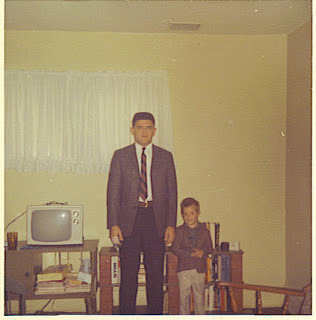
Today, June 5, 2011, is my dad's 70th birthday. お誕生日お目出度う, dad.
My dad's been a really important part of my life. As are all dads in the lives of those of us who have dads. Which is all of us. Even those who don't know their dads. But I know mine. Or at least I think I do.
My dad's done a lot of stuff that readers of this blog ought to thank him for. I wouldn't have turned out the way I did had he not made some pretty unusual decisions in his life.
When I was just eight years old and my sister was six, my dad was working for the Firestone Tire and Rubber Company. He was right there in corporate headquarters in Akron, Ohio working a respectable middle class job like a good dad does to provide for his family. One day his boss asked him if he would consider packing us all up and moving us to Nairobi, Kenya. He generously gave my dad a weekend to decide.
Now you kids out there have to understand this was way before the Internets were even a twinkle in Al Gore's eye. We were living in Wadsworth, Ohio, a teenie tiny little town without even a well-stocked library. My dad barely knew where to find Kenya on a map. His only sources of reliable information were the World Book Encyclopedia and a couple of people at Firestone he didn't know all that well who had been over to Nairobi. At least they said it was an OK place.
On the basis of this and my mom's enthusiasm for adventure, my dad moved us all out to Africa where we spent a little over three years. If I'd spent those three years, from ages eight to eleven, in Wadsworth, Ohio with its Saturday morning cartoons, its shopping malls and its population of proudly White Americans who do not question their God or their government I would have turned out a totally different person from who I am today. Thank you dad, for saving me from that fate.
I'm not sure my dad ever really understood my fascination with monster movies, rock and roll guitar and Zen. My mom was the arsty one. But he never said a word to try and dissuade me from pursuing the things I loved. He bought me my first guitar and my first bass.
And my dad paid my way through college. Can you imagine that? He decided some time early in my and my sister's childhoods that neither of us would take out loans for our Bachelor's degrees. Some of my friends are still paying off their college loans. But I'm not. Amazing. I can't thank him enough for that.
When my mom became ill dad took it upon himself to care for her. He didn't want her languishing in some medical facility. He made sure that she was with him in her own home right till the end. Lots of people with spouses that have the condition my mom did dump their spouses and don't look back. Not my dad. The sacrifices he made for her... Aw jeez, I'm tearing up just writing about it. Read Zen Wrapped in Karma Dipped in Chocolate if you want some more details.
There's so much more I could say. But I'd rather go downstairs and hang out with the man himself. You'll excuse me. Thanks!
Published on June 05, 2011 07:29
June 2, 2011
GALVESTON, HOUSTON, DOGEN and BUDDHIST CLERGY
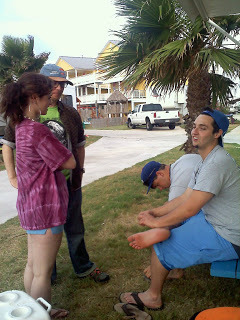
I've just returned from three days of gallavanting in Galveston, Texas. There was lots of sun, lots of surf, lots of camping equipment. My sister and her husband bought themselves an RV and parked down there at an RV park.
Before that I was at the Houston Zen Center with the incredible Gaelyn Godwin. I gave two talks in one day, something I usually try to avoid. The first talk, at around 10 am was about Dogen's statement that:
"Although realization is not like any of the thoughts preceding it, this is not because such thoughts were actually bad and could not be realization. Past thoughts in themselves were already realization. But since you were seeking elsewhere, you thought and said that thoughts cannot be realization. However, it is worth noticing that what you think one way or another is not a help for realization. Then you are cautious not to be small-minded. If realization came forth by the power of your prior thoughts, it would not be trustworthy. Realization does not depend on thoughts, but comes forth far beyond them. Realization is helped only by the power of realization itself. Know that then there is no delusion and there is no realization."
This comes from Kaz Tanahashi's translation. The rest of this passage can be found here. That is, if I didn't mess up the link. Nishijima Roshi's translation is a bit better. But I don't have a link for that, unfortunately.
I recorded the talk and maybe one of these days it'll end up in a podcast. Is anyone listening to these? I think John Graves is doing a tremendous job with them.
The second talk was about my growing feeling that perhaps we really don't need Buddhist clergy anymore -- if we ever did in the first place. The talk was partly based on an article called Church Without Clergy. This article examines the problem of clergy from the Protestant Christian perspective. But most of what the author says could be applied to Buddhism as well.
A lot has been written in books like Scott Edelstein's Sex and the Spiritual Teacher: Why It Happens, When It's a Problem, and What We All Can Do and even my own latest book Sex, Sin, and Zen: A Buddhist Exploration of Sex from Celibacy to Polyamory and Everything in Between about the problem of power differential when so-called "spiritual teachers" have sex with so-called "students." I got into a conversation recently with my first Zen teacher about this. And during the conversation the idea emerged (I can't recall from which of us, probably from him) that perhaps the problem is not how to deal with this power differential, but that there is any power differential at all involved. It does not need to be that way. This is a problem that goes far beyond any considerations of student/teacher sex and into the entire structure of Buddhist clergy.
It's a big topic and I've been trying hard to write an article about it. So far I have failed miserably. So you won't be reading that one today. But I think it's a very important subject.
I recorded that talk too. And maybe one of these days it will also end up in a podcast.
 I also got to spend some time with my friend Christine Buckley. She writes a blog called Seeking Shama that is very good and wonderful and great. I keep forgetting to plug it here. Sorry Christine!
I also got to spend some time with my friend Christine Buckley. She writes a blog called Seeking Shama that is very good and wonderful and great. I keep forgetting to plug it here. Sorry Christine!We ate ice cream and looked at bad art.
Published on June 02, 2011 09:06
May 26, 2011
T FOR TEX-ASS!
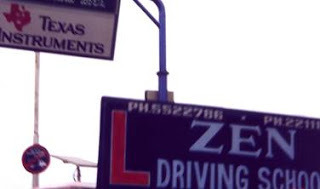
Before I forget, this weekend I'll be in Houston, TX. On May 29, 2011 I'll be speaking at the Houston Zen Center 1605 Heights Blvd., Houston, TX. This is also a one-day retreat. All of you people who constantly gripe at me about "why don't you lead a retreat?" here's your chance to stop belly-achin' and come do some zazen.
I've also updated the tour page with a talk in NYC, some more Zero Defex gigs and other talks and things. Go look.
*****
Also remember my new/old book Death To All Monsters is available now as a downloadable eBook or print-on-demand. Here are the links where you can get it:
http://www.lulu.com/spotlight/BradWarner
http://tiny.cc/dgrnx (Amazon)
http://tiny.cc/g38eg (Barnes & Noble)
For your entertainment, here is the afterword to the book:
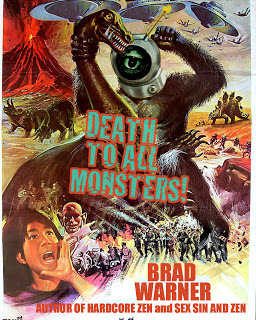 I tend to assume that a number of people who have purchased this book did so because they are fans of my other nonfiction books, Hardcore Zen, Sit Down and Shut Up, Zen Wrapped in Karma Dipped in Chocolate and Sex Sin and Zen. Thank you.
I tend to assume that a number of people who have purchased this book did so because they are fans of my other nonfiction books, Hardcore Zen, Sit Down and Shut Up, Zen Wrapped in Karma Dipped in Chocolate and Sex Sin and Zen. Thank you. I wrote this book between 1996 and 1998. So it predates my first nonfiction book, Hardcore Zen (2003), by several years. I sent Death To All Monsters out to a number of publishers at the time and collected a lot of rejection notices. One publisher expressed some interest and I rewrote the book according to their suggestions. But in the end they passed on it as well. The version you just read contains some of their suggestions but not all of them.
Like my nonfiction books, this one is a true story. But unlike those books it is not a factually true story. I'm not contending, for example, that the Japanese Imperial Army really shot down an alien spacecraft at the end of World War II. That part of the story is made up. But much of the rest of this book is essentially true.
In many ways this novel is almost as autobiographical as my later nonfiction books. Bob Morningstar, the protagonist, is based on me and this is the story of my life working for Tsuburaya Productions in Tokyo, one of the world's leading producers of Japanese science fiction films and TV shows. Although there was no real movie Death To All Monsters, there really was episode 12 of the TV series Ultra Seven.
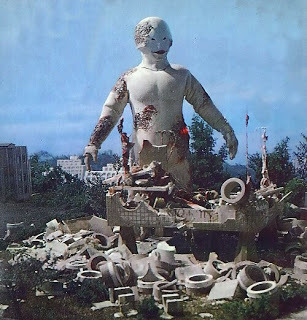 Ultra Seven was a Japanese television series featuring a superhero from outer space named Ultra Seven who stood 40 meters (120 feet) tall and routinely battle equally gigantic alien monsters who wished to take over planet Earth. It was a follow up to the company's more well-know superhero TV show, Ultraman. The monster in episode 12 of Ultra Seven came from a planet whose dominant species had destroyed their own environment in an atomic war. They desired to steal the white corpuscles from human blood in order to heal their dying species. The story and the imagery (see the photo on this page) in this episode proved to be too much like the real story of those who had survived the atomic bombings of Hiroshima and Nagasaki. So after a few broadcasts in the late sixties and early seventies, this episode was withdrawn from circulation. The other 48 episodes of the series played countless times in reruns and continue to play even today. From the time of its withdrawal, episode 12 was never included on any home video or DVD release and was not mentioned in any official publications. Official episode guides all cryptically skip straight from episode 11 to episode 13 without explanation.
Ultra Seven was a Japanese television series featuring a superhero from outer space named Ultra Seven who stood 40 meters (120 feet) tall and routinely battle equally gigantic alien monsters who wished to take over planet Earth. It was a follow up to the company's more well-know superhero TV show, Ultraman. The monster in episode 12 of Ultra Seven came from a planet whose dominant species had destroyed their own environment in an atomic war. They desired to steal the white corpuscles from human blood in order to heal their dying species. The story and the imagery (see the photo on this page) in this episode proved to be too much like the real story of those who had survived the atomic bombings of Hiroshima and Nagasaki. So after a few broadcasts in the late sixties and early seventies, this episode was withdrawn from circulation. The other 48 episodes of the series played countless times in reruns and continue to play even today. From the time of its withdrawal, episode 12 was never included on any home video or DVD release and was not mentioned in any official publications. Official episode guides all cryptically skip straight from episode 11 to episode 13 without explanation.Ultra Seven spawned a following of dedicated and often obsessive fans not unlike fans of Star Trek in the USA and Doctor Who in the UK. These guys really, really wanted to see the mysterious episode 12. The company had in its possession a single print of the show. For reasons I never could quite understand, this print often found its way into really weird places. For a while it was stored in an unlocked locker of one of the employees. At one point it disappeared for several weeks causing major concern within the company. People were constantly trying to get at it as if it contained some sort of bizarre secrets.
Some time just before I started working for the company, my predecessor at the international sales division sold the broadcast rights to the Ultra Seven series to Turner Network Television in America. Unlike me, this guy wasn't really a fan of the shows we made. He had no idea that there was any problem with episode 12. So he sent the entire series to America.
I got word of this and made a quiet decision not to pursue the matter. As I hoped, the episode was shown on American TV, allowing me to see it for myself when someone sent me a VHS tape. And, of course, that version subsequently made its way back to Japan. By the mid-1990s any hardcore fan who really wanted to see the show could track down a bootleg tape. Yet officially the episode still does not exist even today.
Whenever the subject of releasing the episode came up the company people reacted to the idea in much the same way someone in the US government circa 1950 might have reacted to the notion of supplying the secret of the hydrogen bomb to the Soviet Union. It was dangerous even to mention the idea lest someone believe you were a traitor! I found this highly amusing. Much of that air of paranoia became the basis for the plot of the novel. I wondered what would happen if episode 12 of Ultra Seven really did contain some deep dark secret.
Unlike Bob, I never got in trouble for allowing Turner to broadcast the show because technically I really didn't. I had plausible denial on my side. It wasn't me who sent the films to America and it wasn't my job to monitor what went on after they were sent out. I only learned about the broadcast when a description of the episode appeared in TV Guide and some friends of mine in America who were obsessive fans of the show told me about it just days before the intended broadcast. All I did was to pretend I hadn't heard.
That was the situation upon which I based the story. What's also true in this fictional story are the people. All of the characters are based to one degree or another upon people I actually knew. Some have been highly fictionalized. Some not.
Jackie Satsuma is based on my first boss at Tsuburaya Productions, the late Jimmy Ugawa. Ugawa had been in the Japanese Imperial Army during the war. And, although he was not stationed in Manchuria like Satsuma was, another important person in my life was. The Zen teacher from whom I received ordination, Gudo Wafu Nishijima, actually had been stationed in Manchuria where he saw no action at all during the war. Lucky for him. Both men had a deep impact on my life. Gudo makes a cameo in this novel as well.
The character of Charlie Lo isn't anyone specific but is based on a number of people I interacted with during my time at Tsuburaya. There were a lot of guys in various Asian countries who ran film distribution companies. Many of these people were quite ruthless. The line in the novel about how people would kill each other over the rights to Disney films was something I actually heard from one of my coworkers. I have no reason to doubt it. Some of the people I dealt with were kind of scary and I often wondered how far they would go if they felt their financial interests were threatened.
Even some of the really outlandish characters in this book have real life counterparts. There were American fans of our shows every bit as obsessive as O'Dell and Daisy. There were ex-pats living in Japan just as weird and wonderful as Nick and Emily. There was even an extremely enthusiastic fan in Southeast Asia who built his own completely unauthorized museum of our shows much like the one owned by the fictional Ajrat Gupta.
The story of the people making a Gorezolla film in America is based on real events that took place when Tsuburaya attempted to hire a team to remake Ultraman in Hollywood in the early 90s. The results were a complete catastrophe and the program was never shown in the USA, though it appeared on home video in Japan.
In addition to the people in the story, many of the events contained in this novel actually happened. Some of you will recognize a few scenes that I wrote first in fictional form here and then later rewrote for Hardcore Zen. The scene in which Bob passes out while dancing in a monster costume actually happened to me, and some of the stuff that occurs in temples in the novel actually happened to me at Zen temples in Japan. Most of the set visit stuff is also essentially factual.
This was a fun novel to write. But it took a lot of work. I'd written loads of short stories by the time I decided to write this, but never a full-length novel. In order to keep all the action straight I had post-it notes all over one wall of my apartment so that I would know where each character was and what they were doing even in chapters in which they didn't appear.
It took a couple of years of daily work to turn that vague idea of making a novel based on the story of Ultra Seven episode twelve into a coherent book. At the time I was working a regular five-day-a-week job, so I had to dedicate all of my free time to the book. It was a massive amount of work. Yet even when the book failed to find a publisher I never felt like I had wasted my time.
I hope you have enjoyed this book as much as I did.
Thanks for reading!
Brad Warner
April 21. 2011
Published on May 26, 2011 18:19
May 24, 2011
Two Random Questions and a Plug
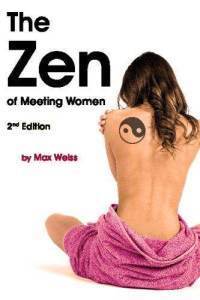
RANDOM QUESTION 1:
I have sat with both Soto and Rinzai teachers and I am still debating about which school is the best for me. I was wondering what I should look for in myself to help me decide which suits me better. I realize you don't know me to answer that question, so any advice on how I should decide would be helpful. I am 28 years old and have practiced (admittedly off and on) for 12 years. I am not sure about the outlook of both of these schools when it comes to women and equal rights, I wouldn't think either are misogynistic, however, I would like to know their differences, due to the fact that I am a woman and such issues matter a great deal to me. Last but not least, your books are great, they are down to earth and a great read. I appreciate your writing style a great deal and your straight up answer.
RANDOM ANSWER 1:
There really is no answer as to what the views of the Rinzai and Soto schools are in terms of women and equal rights.
As for Rinzai, there is no real school as such. At least as far as I'm aware, there is no central organizational body. So it would be impossible to determine the school's views on anything at all. You might try looking up the words of Master Lin Chi (aka Master Rinzai). But I wouldn't know where to find anything regarding women and equal rights. These were probably not big concerns in medieval China. Besides that, the Rinzai school doesn't necessarily derive from the teachings of Master Lin Chi in the way that Christianity supposedly derives from the teachings of Jesus and Islam from the teachings of Mohammed.
Dogen Zenji is generally considered to be the founder of contemporary Soto Zen. In 1240 he composed a piece called Raihai Tokuzui, which means roughly "Bowing to What (or Who) Has Attained The Marrow (of the Truth)." In this piece he is very clear that women, children and even animals can attain the truth as surely as any man. It appears to have been written to counter what we today would call sexist and racist views among the monks who practiced under his guidance.
Here is an article I found in a very lazy Google search on the subject. I typed in "Dogen women" and this was the first thing that came up.
Here is one translation of Raihai Tokzui. I just skimmed over it, but it seems like a good one. The scholars who made it are pretty reputable.
However, even this isn't really what you might call the view of the Soto School. I doubt that the Soto-shu headquarters in Japan has ever issued anything resembling an official statement on the subject of women and equal rights.
The book Zen Women: Beyond Tea Ladies, Iron Maidens, and Macho Masters might be useful to answer your question more thoroughly. The book The Zen of Meeting Women probably will not.
RANDOM QUESTION 2:
You describe zazen in the last chapter of Hardcore Zen. In it you say that you don't need to try and stop your thoughts. You go on to say that straightening your posture should slow your mind. I'm a little confused about this. Is it not a goal of zazen to clear your mind of thoughts?
RANDOM ANSWER 2:
No. The goal (or even "a goal") of zazen is not to clear your mind of thoughts. There is no goal of zazen.
This is the hardest part of zazen practice; that there is no goal or point to it. You just sit and experience what you experience while sitting. That's it.
If you think a lot, then that is the content of your experience. If you transcend all thought and zone out into pure white light or whatever, then that is the content of your experience. Neither one is better or worse than the other. Our habit of defining certain experiences as better or worse than others is the problem.
Of course it's best not to use your zazen as a time to sit and ponder stuff. You are encouraged to let your thoughts go as soon as they appear. But that's not the same as trying to clear your mind of thoughts. Attempting to clear your mind of thoughts is just another type of goal-oriented intentional activity. Goal-oriented intentional activity is always problematic because it separates you from the real moment of the present.
PLUG FOR SHOPLIFTING FROM AMERICAN APPAREL:
The folks who are making the film I'm in, are getting down to the wire in their fund raising campaign. Below is a message from the director.
Note that for a donation of $25 you get all kinds of neat stuff including a DVD of the film, a T-shirt and the soundtrack. I don't know how he's doing this. But it's a really good deal if you ask me. $25 is less than you'd pay for all that stuff if you decided to buy it retail after the movie came out.
Take it away, director Pirooz Kaleyah:
"This is our very first fundraising drive for SHOPLIFTING FROM AMERICAN APPAREL and we are aiming to raise $10,000 for production costs. This includes casting, location scouting, art direction, equipment and crew. Any remaining funds from this drive will go straight to post-production. Almost as importantly, other potential donors and investors will use our success at IndieGoGo as a gauge by which to measure the public appeal of our project, so your donation may be worth twice as much!
"Also, be sure to let everyone know that there are all kinds of PERKS for donating depending on how much one donates. For $25 they get a t-shirt, soundtrack, special thanks credit AND a DVD! For $100 they also get a limited edition chapbook of poetry with contributions from all the writers involved in the film and a movie poster, ETC."
Published on May 24, 2011 09:23
May 19, 2011
MANTRA 101
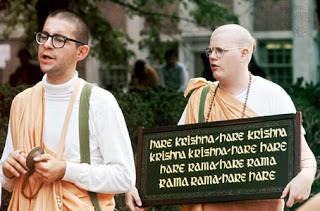
Last time I said:
A good example of this is the way we deal with the Heart Sutra, which is considered by many to be the single most important sutra in Zen, the one that defines Zen as a distinct form of Buddhism. It ends with a whole big long section that says how wonderful this one mantra is and how everyone should proclaim it. I do not know, nor have I even heard rumors about, a single Zen Buddhist who chants that mantra.
When I wrote that I took it for granted that most readers had the same understanding as I do as to what it means to chant a mantra. What I was referring to was the way mantras are chanted in Hinduism and Hindu-based religions.
The Hare Krishnas, for example, chant the mantra Hare Krishna Hare Krishna Krishna Krishna Hare Hare Hare Rama Hare Rama Rama Rama Hare Hare over and over and over sometimes for hours on end. In Trancendental Meditation, one is given a mantra by one's instructor guru. One then repeats this mantra silently while one meditates. It's usually just a few syllables long. Repeating this sacred word or phrase is supposed to help focus the mind on the divine. Here's a page that talks about the practice.
I just checked Wikipedia's entry on mantras and it appears that what I'm referring to is "mantra japa," which they define as follows:
Mantra japa was a concept of the Vedic sages that incorporates mantras as one of the main forms of puja, or worship, whose ultimate end is seen as moksha/liberation. Essentially, mantra japa means repetition of mantra,[8] and it has become an established practice of all Hindu streams, from the various Yoga to Tantra. It involves repetition of a mantra over and over again, usually in cycles of auspicious numbers (in multiples of three), the most popular being 108. For this reason, Hindu malas (bead necklaces) developed, containing 108 beads and a head bead (sometimes referred to as the 'meru', or 'guru' bead). The devotee performing japa using his/her fingers counts each bead as he/she repeats the chosen mantra. Having reached 108 repetitions, if he/she wishes to continue another cycle of mantras, the devotee must turn the mala around without crossing the head bead and repeat.
That's what I was talking about. And that is what the end of the Heart Sutra appears to me to be telling us to do with the mantra gate gate paragate parasamgate bodhi svaha.
But loads of people wrote in to tell me that at their temple they chant the Heart Sutra every morning or every Sunday or whatever. Yes. This is true. But I've never been to a Zen temple where they chant that mantra more than once.
I suppose one could read the Heart Sutra in such a way that it doesn't tell us to do "mantra japa" with that mantra. But I've never read it that way. I've always thought it was clearly telling us that we should repeat gate gate etc. over and over and over again.
Sorry for creating confusion.
M'kay?
Published on May 19, 2011 15:26
May 18, 2011
"LA Story" and "Is Zen Nutty?"
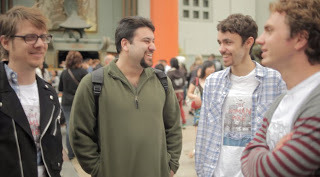
I arrived back in Akron, Ohio at about midnight last night. I don't have car insurance. I thought I did. When I was in California I called my insurance company and discovered that my insurance had lapsed in December. Today I'll sign up with another company. But I'll have to drive to that company because this is Akron, Ohio and you can't get anywhere on foot. I hope I don't crash.
We finished filming the Los Angeles scenes of the movie Shoplifting From American Apparel on Monday. The photo above is from the scenes we shot on Saturday on Hollywood Boulevard. The people in the picture from left to right are me, director Pirooz Kaleyah, novelist Jordan Castro who plays "the real Tao Lin" as opposed to me who is (I who am? I whom am?) playing "Brad Warner as Tao Lin," and author Noah Cicero, who I think is basically playing himself.
Also in the film are internet hottie Bebe Zeva, actress
It's slowly dawning on me that I am playing the largest role in this movie. I play the nameless main character of the novel Shoplifting From American Apparel (this is an excerpt) based on the real-life writer of said novel, Tao Lin. As such, I have the most lines and am the focal character. I'm playing the guy who shoplifts from American Apparel, the title character. I'm glad I didn't realize this until it was too late or I'd have been intimidated to even do it.
Saturday and Monday were the most interesting scenes to film. They were two parts of a scene in which Tao Lin (me) does a reading at Skylight Books in the Los Feliz neighborhood of Los Angeles. It's one of my favorite bookstores in LA in spite of the fact that they turned my publicist down when she tried to schedule a reading for me there and I didn't see any of my books on the shelves (though I have seen them there in the past). Are you reading this, Skylight Books people?
Tao's reading is attended by Audrey (Bebe Zeva) and Jeffery (Travis McFarland). Tao is trying to get with Audrey. But Jeffery keeps hanging around and may, for all Tao knows, be Audrey's boyfriend. Tao doesn't care and keeps acting like a dick to Jeffery to try to get rid of him. Eventually this works and Tao bags Audrey. But the next morning he is cold and distant to her. It's clear the whole thing meant nothing to him and she is hurt by this.
I suppose I should have put "spoiler alert" before that explanation since it's a key scene near the end of the film. But by the time the movie comes out most of you will have forgotten this, I hope.
Anyhow, I had to play this character who goes through this stuff. The weird part for me is that I have been in situations somewhat similar to this. Every writer has, especially those of us who are single. You meet fans of your preferred gender who seem to be attracted to you. But often they're with someone else.
In my case I have all this Buddhist morality shit hanging over me. When I'm in that situation I deliberately try not to interfere with people's existing relationships. I don't think it's right to do so. And I know that my own life will also be improved if I behave in a way that is morally sound.
But I found myself having to play a character who does all the things I am often very much tempted to do but don't do. It was difficult overcoming my own inhibitions and becoming this character. It was even harder playing the scene in which I had to be cold and distant to "Audrey" the next morning. As Bebe (playing Audrey) got more and more into character I began to feel worse and worse about myself. Even though it was all completely fictional, and even though there were all kinds of people with cameras and microphones and all kinds of retakes and so forth, as I said the lines it began feeling real. I was getting cotton mouth during the shoot.
I think a good actor gets a sense of what Buddha meant when he talked about the unreality of the permanent self. In order to act out a scene as a character you have to drop your attachment to the person you think you are and, at least for the duration of the scene, become someone else.
It's funny how easy that can be once you find the ability to drop who you think you are. There seems to be a corner you can turn or a switch you can flip after which you just slide into being this other person. After a few hours of shooting I found I had to make a certain degree of effort to return to my normal self.
As Mr. Spock would say, "Fascinating."
***
In the past week I have received three different variations on the same question. There must be something in the air. The latest goes like this: "I guess my first questions are 'does Zen Buddhism have any crazy and hard to digest stories and ideas behind it? how much does it differ to other forms of Buddhism? And if these stories/concepts/mantras exist in the Zen world, do you take them with a pinch of salt?'."
The answer about crazy and hard to digest stories is yes and no. But mostly no. In Zen there is no importance attached to matters of belief. What you believe is largely irrelevant. Belief is just more stuff that your mind does. It might have some relevance, but only in terms of how your beliefs affect your behavior. There is no God or Buddha or anyone else who gives a shit one way or the other what you do or do not believe.
That being said, there are as many weird hard to swallow stories associated with Zen as with any other religion. The Lotus Sutra, Dogen's favorite sutra, has passages in which Buddha does all kinds of crazy miraculous things like shooting beams out of his forehead and suchlike. The koans have stories about people transforming themselves into animals or chopping off other people's fingers just to prove a point. If you took that stuff literally it would be pretty much like any other religion.
The great thing about Zen, though, is that there is never any pressure to believe any of this stuff. You can take it any way you want to. Very few Zen people take most of it literally. Gudo Nishijima used to be adamant that it was all metaphorical, especially the references to reincarnation.
A good example of this is the way we deal with the Heart Sutra, which is considered by many to be the single most important sutra in Zen, the one that defines Zen as a distinct form of Buddhism. It ends with a whole big long section that says how wonderful this one mantra is and how everyone should proclaim it. I do not know, nor have I even heard rumors about, a single Zen Buddhist who chants that mantra.
***
Cool?
OK. Also remember my new/old book Death To All Monsters is available now as a downloadable eBook or print-on-demand. Here are the links where you can get it:
http://www.lulu.com/spotlight/BradWarner
http://tiny.cc/dgrnx (Amazon)
http://tiny.cc/g38eg (Barnes & Noble)
Published on May 18, 2011 08:41
May 14, 2011
CELEBRATE THE RETURN OF CHRIST WITH ZERO DEFEX!
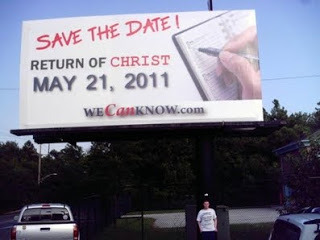
As everyone knows by now, Jesus Christ will begin the Rapture in which all the faithful are taken up to Heaven on May 21st. In honor of His second coming Zero Defex will play a special show on that final day on Earth for all the faithful on May 21st at Annabelle's Lounge in Akron with Don Austin, Cheap Tragedies and Weird Penis. The show is free.
So, since this is the final day for Planet Earth as we know it, I recommend that all of you in far flung places spend your last savings to come see us rock out the Rapture. How better to spend your final hours if you're one of the faithful, or to prepare for seven years of torment and the coming reign of the Anti-Christ if you're not?
Here's a preview of what to expect that day:
For more on the second coming, check out this article from LA Weekly.
For those of you with pets who want to know what to do with Fido or Felix or Crackers the parrot after you are taken up to meet Jesus in the air, we recommend Eternal Earthbound Pets or After The Rapture Pet Care. These kindly atheists have set up organizations to lovingly care for the pets of the faithful after Jesus calls their owners home.
Filming on Shoplifting From American Apparel has been going nicely. Yesterday we shot a whole bunch of scenes on Hollywood Boulevard near Vine. Weird homeless-looking people kept trying to walk into the shots. We had two guys tell our director they would pray for him to go the Hell because he wouldn't give them some of the granola bars he'd bought for the actors and crew. We had a human beatbox try to beatbox his way into the production. Oh the fun of Hollywood!
I'd try and think of something Zen to say. But I gotta go now.
I'll see all of you on May 21st!
Published on May 14, 2011 08:57
May 12, 2011
Tonight at Against The Stream, Saturday Zen & Yoga, Death To All Monsters
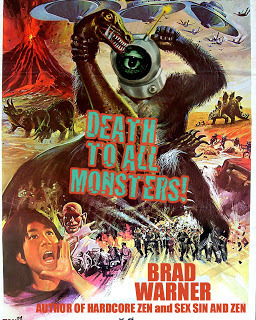
Tonight, May 12, 2011 (Thu) at 7:30 pm I'll be speaking at Against The Stream 4300 Melrose Ave, Los Angeles, CA. I'll talk about Buddhism and Dogen and sex and zen and the Three Stooges. So be there!
On Saturday May 14 there's a Zen and Yoga one-day sesshin at the Hill Street Center 237 Hill Street in Santa Monica, CA. This will be led by Nina Snow. Nina's one of my closest friends and an experienced Yoga teacher and Zen practitioner. She'll lead a one-hour Yoga session suitable for all levels of experience at the beginning of the day (10 am) followed by zazen until around 3:30 pm. I'm going to see if I can make it. I'm not sure at this point.
Why am I not sure if I can make it? Glad you asked! It's because on Saturday I am filming scenes for the movie Shoplifting From American Apparel, in which I am arguably playing the main character. I say arguably because the character I'm playing, author Tao Lin, is being played by no fewer than three people, of whom I am one. This will be a very fun and funny and weird movie. If my scenes finish early enough and if I can get a ride out to Santa Monica, I'll be at Hill Street Center before things wrap up there. If not I won't.
My talk on Tuesday at the Ventura Buddhist Temple was a whole big bunch of fun. I thought it came out pretty well. The folks in Ventura are always a good audience. They participate actively in the discussion, which is what I always look for.
And it was a gas for me because someone brought along a printed copy of my new/old book Death To All Monsters! for me to sign. That was the first time.
For those who don't know, Death To All Monsters! was my first novel. It was completed in 1998 when I lived in Japan and worked for Tsuburaya Productions. The book is available as a download or print-on-demand at the following websites:
http://www.lulu.com/spotlight/BradWarner (print-on-demand available only here)
http://tiny.cc/dgrnx (Amazon)
http://tiny.cc/g38eg (Barnes & Noble)
The downloadable e-book is only a mere $5! How can you pass up a bargain like that? The answer is you cannot.
Here's what the book is about:
When Bob Morningstar started working for Nakajima Productions, Tokyo's leading producer of trashy man-in-a-rubber-costume monster-on-the-loose movies he had no idea the job would involve danger, international espionage and the possible destruction of all life on planet Earth. Bob has a problem. It seems he sent Death To All Monsters, the legendary "lost" film starring Gorezolla, Emperor of Monsters, to Shanghai by mistake.
What's the big deal? Death To All Monsters, like every other Nakajima Productions movie, is a juvenile fantasy about the giant monster Gorezolla battling it out with one of his warty rubber enemies. But it's a very big deal to Bob's boss, Junichi "Jackie" Satsuma, chain-smoking, dirty joking veteran of the Japanese Imperial Army who treats the only surviving print of the legendary "lost film" like it was the sort of classified document he used to deal with during the war against the Yankee pigs. And it's a big deal to the Joe Tortelli, president and CEO of Great Destruction Productions, Nakajima Productions' LA based US distribution arm, a man with shady connections to the secret services. And it's a matter of major importance to Charlie Lo, thoroughly sleazy self-styled Ted Turner of Hong Kong in whose hands the missing movie has mysteriously ended up. How exactly did that happen? Could it have anything to do with BJ Cheng, Nakajima Productions' "China expert" who seems to spend most of his workday doing the Japan Times' crossword puzzle? What's his relationship with Charlie Lo, anyway? And just what is in this movie that makes it so damned valuable to everybody?
As if that's not enough, Bob's girlfriend Keiko is kidnapped by a couple of half-crazed monster fans. Their demands are simple; release Death To All Monsters to people of the world, all of whom are dying for a glimpse of this classic piece of Japanese trash science fiction. Then there's the little matter of Bob's close encounters with a certain "alien being" who just happens to resemble a man in a cheap rubber costume. The alien tells Bob that Death To All Monsters contains secrets of cosmic importance, secrets that could lead to mankind's total destruction.
Now Bob must undertake a journey through the wilds of Hollywood, the jungles of Tokyo, the mazes of Hong Kong and the slums of Calcutta to get the movie back and save his girlfriend… Or die trying.
It's fiction. But it's all true.
Published on May 12, 2011 10:08
Brad Warner's Blog
- Brad Warner's profile
- 595 followers
Brad Warner isn't a Goodreads Author
(yet),
but they
do have a blog,
so here are some recent posts imported from
their feed.



